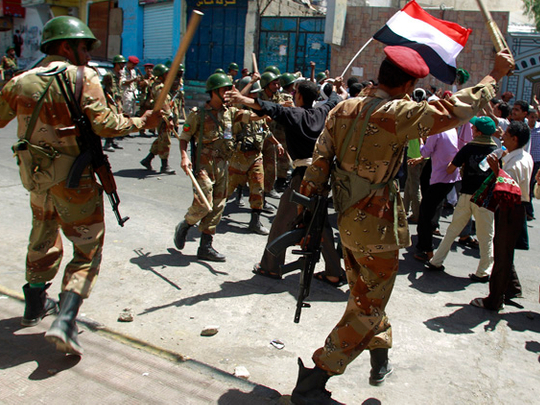
Observers of the political scene in Yemen may have thought that the current political crisis is only between President Ali Abdullah Saleh and the opposition. Only a few pay attention to hundreds of thousands of youths in change squares in Sana'a, Aden, Taiz and Ibb, among other cities.
The ruling regime is negotiating with the opposition through mediators, while the opposition is mobilising its ranks and reconsidering its stance based on the new political game and in order to become a substitute for the old system.
An obvious question comes to mind: is this the new scenario for Yemen — an old system be replaced by an old opposition? In fact, the ruling regime and the opposition have the same political mindset and move in the same circles! But what about the ‘youth of change', and who speaks on their behalf in the negotiations between the regime and the opposition?
If the regime is addicted to the ‘political game', there are some opponents who are political opportunists and will not hesitate to make big concessions to remove the existing regime and divide Yemen's cake between the opposition in the north and in the south.
The traditional benign opposition, at home or abroad, found a precious opportunity in the form of the ‘youth of change'. The opposition then grabbed the chance to ride the wave of change in Yemen in order to come to power.
Settling scores
However, this is not a call for completely severing ties with the opposition or understating its role in the past, or marginalising its efforts and sacrifices. But, it is a call for justice and objectivity in understanding the driving factors and reasons for the demands for change in the Yemeni street.
It is not in Yemen's interest to let the traditional opposition dominate the whole opposition movement. And it is not in the interest of Yemen or neighbouring countries to let the traditional opponents steal the efforts and sacrifices of the young people and assume power.
This opposition must not be given any chance to hijack the youth revolution and take power because they will begin to settle scores at the expense of Yemen and its young heroes.
The best thing the old opposition can do is to give way to the young people who have been sleeping in open spaces and receiving the bullets of the regime with bared chests for three months.
We are fed up with the old political position, which reduces Yemeni scene to merely a struggle between the ruling regime and the opposition. Meanwhile, protests in Yemen's change squares offer a new and different position consistent with that of the modern world.
So, it is vital that the young people be engaged in all talks and negotiations dedicated to finding a solution to the crisis in Yemen. This is simply because starting dialogue with the ‘youth of change' is key to Yemen's future. And negotiating with the opposition will only complicate Yemen's political deadlock and hinder efforts to find a solution.
Totalitarian streak
It is wrong to portray the Yemeni opposition as angels who will solve all of Yemen's tragedies, including poverty, tyranny and the absence of all elements of the modern state. Worse is that there are some authoritarian figures within the opposition who will exhibit their totalitarian streak once they get the chance.
The worst and most humiliating question is: what is the alternative?
The youth, who hold their ground in many change squares, are competent enough to run the country as a modern state.
No one can ignore the creative potential of the Yemeni youth in the fields of trade, technology, arts and telecommunication under tough economic and political conditions. There are many successful examples set by young Yemenis in the Gulf, New York, Chicago and Shanghai.
Therefore, the youth, who are eager to see a new Yemen that capitalises on its human capital, are the only ones who can get their country out of its political, economic and social crises — not the traditional opposition.
The ‘youth of change' are the key to Yemen's future, and hence must have the final word in determining the fate of their country.
Sulaiman Al Hattlan, a former Nieman Fellow at Harvard, is the host of Gulf Talks on Al Hurra TV.









